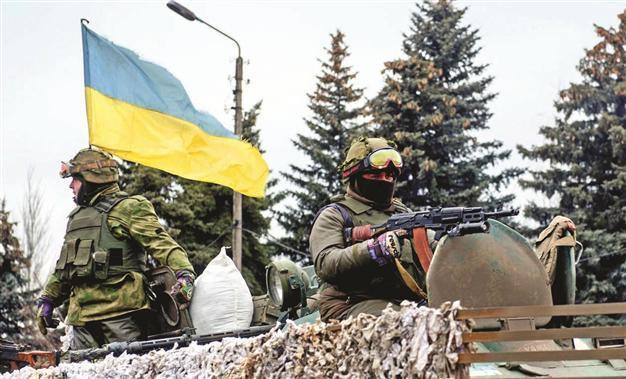EU freezes new sanctions ahead of Ukraine peace summit
KYIV - Agence France-Presse

AFP Photo
The European Union on Feb. 9 put fresh sanctions against Moscow on hold ahead of a summit to thrash out a Ukraine peace plan aimed at ending 10 months of bloodshed.French Foreign Minister Laurent Fabius said the EU would hold off implementing new individual sanctions to improve the chances of success at the four-way summit planned for Wednesday in Minsk.
"The latest peace initiative shows that things have begun to move," Fabius said in Brussels.
"The principle of the sanctions will be kept but their implementation will depend on the situation." EU foreign ministers had been set to formally sign off on adding 19 more people to a sanctions list over Moscow's alleged backing of pro-Russian separatists in Ukraine.
The announcement came as officials from Ukraine, Russia, Germany and France were to hold preparatory talks in Berlin ahead of the hoped for meeting in the Belarussian capital to push the new peace deal.
Russian President Vladimir Putin, however, has warned that a "number of points" still needed to be hammered out before the meeting could take place.
German Chancellor Angela Merkel flew to Washington on Monday to discuss the European-brokered peace initiative with US President Barack Obama in the latest leg of a frantic diplomatic push to stop the conflict escalating as the White House mulls supplying weapons to Kiev.
The latest peace bid is being billed as a last-ditch effort to halt the spiralling bloodshed in east Ukraine that has cost at least 5,400 lives since April.
Based on a largely ignored peace deal agreed in September in Minsk, the new plan may extend rebel control over territory they have seized in recent weeks, although Kiev is adamant the demarcation line agreed in September should not be shifted.
French President Francois Hollande has said the proposal includes the creation of a 50- 70-kilometre (31-44-mile) demilitarised zone around the current frontline.
German foreign ministry spokesman Martin Schaefer said the Minsk talks' goal would be "a ceasefire to end the bloodshed and thus create space and time for political talks".
The issues on the table include questions about levels of regional autonomy and future elections in rebel-controlled areas, Schaefer said.
Fresh fighting over the past 24 hours between government forces and pro-Russian rebels left at least 11 civilians and nine Ukrainian troops dead, Kiev said.
Ukraine's military said that 1,500 Russian troops and convoys of military hardware had crossed into the country over the weekend.
In a four-way telephone talk on Sunday Putin, Merkel, Ukraine's President Petro Poroshenko and Hollande floated the summit as a the next step to finding a "comprehensive settlement" to end the conflict, Berlin said.
Merkel and Hollande have ramped up their push for peace in recent days, jetting to Kiev first for talks with Poroshenko and then to Moscow to meet with Putin, who the West accuses of masterminding the violence.
A September peace deal agreed in Minsk has been largely ignored, with fighting escalating in recent weeks as the rebels push further into government-held territory.
Wrangling at the meeting in Berlin on Monday afternoon is expected to be intense, with German Foreign Minister Frank-Walter Steinmeier cautioning that the leaders' summit was "not yet sure".
"Our principal objective is to prepare the elements for a document that is acceptable to Ukraine," Olexiy Makeyev, a senior Ukrainian foreign ministry official heading to the meeting, told AFP.
Monitors from the Organization for Security and Cooperation in Europe (OSCE), representatives from Kiev and Moscow and the rebels are also set to hold a meeting Tuesday, Ukraine says.
At home, the White House is facing increasing calls to supply the outmatched Ukrainian army with more weapons to shore up its faltering defences.
But Merkel and many European nations believe weapons could not overturn the military mismatch between Ukraine and the might of the Russian army, and would simply escalate the conflict.
The Kremlin has warned Europe and the US not to use the threat of arming Kiev to try to push Putin into an agreement over Ukraine.
Ukraine and its Western allies accuse Moscow of sending troops and weapons to spearhead the rebellion, but Moscow denies the allegations despite the rebels acquiring heavy weaponry.
While the EU had looked set to extend its individual sanctions, there is no agreement to toughen broader economic sanctions and Spain warned an export ban in place now had already cost Europe some $21 billion euros ($23.8 billion).
















